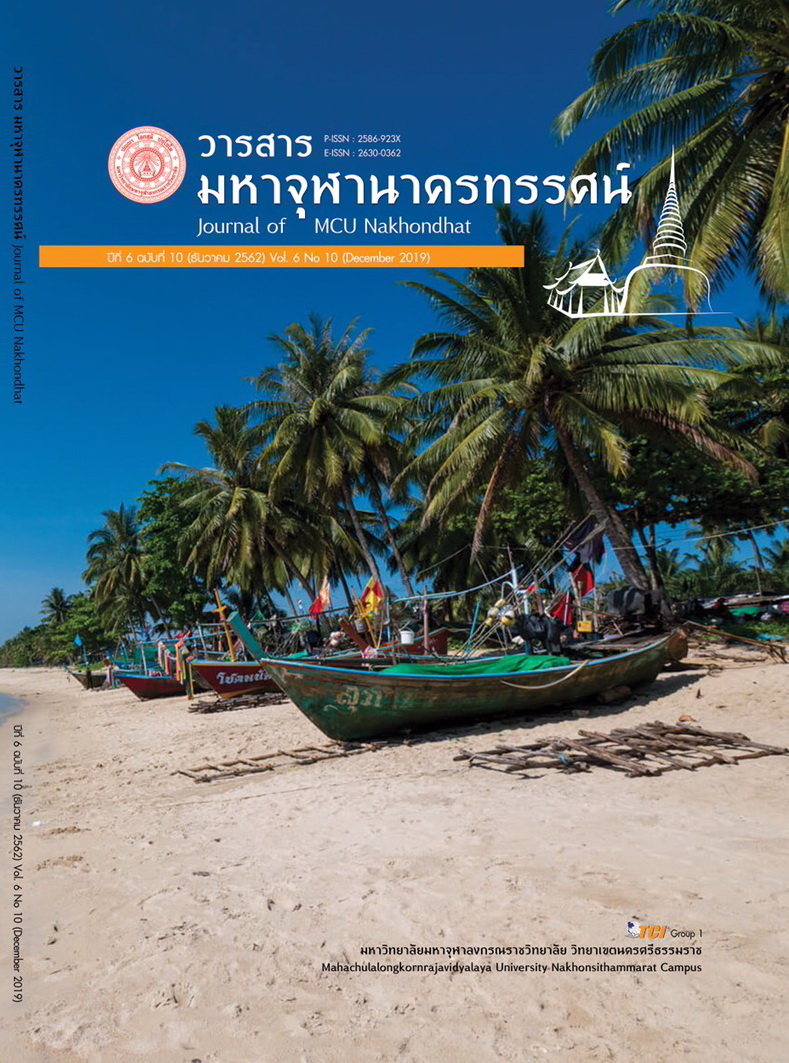CULTURAL GEOGRAPHY: THE CIVILIZATION ROUTE AND CONNECTION OF BUDDHISM IN MEKONG REGION
Main Article Content
Abstract
The objectives of this research were 1) To study the Buddhist civilization and link the language and literature of Thailand in the Mekong region. 2) To study the Buddhist civilization and its associated beliefs and rituals of Thailand in the Mekong region. 3) To study the civilization and link the Buddhist traditions and culture of Thailand in the Mekong region. and 4) To study and analyze the path of civilization and link the Buddhist way of life in Thailand Mekong. This research study is a hybrid, using both qualitative and quantitative. The research was mixed methods research that included quantitative research by questionnaires with simple sampling. The total of sample group was 400 persons and the qualitative research by using the interview form of specific sampling with main informant that include 1) monk 2) qualified person and 3) community leader for total 22 persons . The analysis of civilization route and connection of Buddhism in the Thai way of life at the Central Mekong Region, in order to understand the culture geography of Buddhism.
The research finding indicates that:
- To study found that religious language in various localities, throughout central basin is minimal and tends to disappear. But the priest was also studied in order to study Pali and Buddhist teachings. In the literature, Buddhism and folk literature. Monk also be taught in a way. However, these literary societies often led by traditional forms of entertainment.
- People in the Mekong delta have faith in Buddhism is very high. It is expressed by the religious ceremony, although it is believed that the guardian angels of ancestor spirits ancestors mingled with them. This belief is often inserted into Buddhism is always. In the ritual, the people in the Mekong opinions vary somewhat according to local authorities.
- Faith in Buddhism is the main cause of ritual, made subsequent to become a great tradition. It is considered to be charitable the traditions of Buddhism, then. People in the central basin provides a superstition that exists in the area since ancient times. Adopting today's youth culture of the West and not paying attention to culture as much.
- Civilization and the path to the Buddhist way of life in Thailand Mekong. Both Theravada and Mahayana Buddhism that came to many central Mekong route. From the patronage of the king of the kingdom. The introduction of cultural aspects into it. Traditionally, people in the region, respect phantoms already. The public embraced Buddhism to blend with the traditional rituals are always respected. Make Buddhism in this region are very attached to traditional beliefs are
Article Details
References
กรมการศาสนา. (2547). คู่มือการพัฒนาคุณธรรม จริยธรรม สำหรับผู้บริหาร. กรุงเทพมหานคร: โรงพิมพ์กรมการศาสนา.
ทรงคุณ จันทจร. (2549). ประวัติศาสตร์ลาว (ดึกดำบรรพ์ – ปัจจุบัน). กาฬสินธุ์: ประสานโรงพิมพ์.
ทัศน์ไท พลมณี. (2560). ความเชื่อและพิธีกรรมของชุมชนต่อปราสาทวัดพู แขวงจำปาสัก สปป.ลาว. วารสารศิลปกรรมศาสตร์, 9(1),79-91.
นันทนา ขุนภักดี. (2530). การวิจัยวิเคราะห์ความเชื่อของชาวไทยในสวัสดิรักษา . นครปฐม: โรงพิมพ์มหาวิทยาลัยศิลปกร.
นายอุดม จูมพลหล้า. (2549). วัฒนธรรมทางพระพุทธศาสนาในวิถีชีวิตของคนไทยแถบลุ่มแมน้ำโขงในประเทศไทย. ใน รายงานการวิจัย. จากศูนย์ส่งเสริมและพัฒนาพลังแผ่นดินเชิงคุณธรรม.
พระครูวิมลศิลปกิจ (เรืองฤทธิ์ แก้วเปียง). (2559). การวิเคราะห์บริบทและสภาพการเปลี่ยนแปลงของภาษาล้านนา ในกลุ่ม 5 เชียง. วารสารมหาวิทยาลัยศิลปากร, 36(1), 35-48.
พระพรหมคุณาภรณ์ (ป.อ.ปยุตฺโต). (2548). พระพุทธศาสนาในอาเซีย. กรุงเทพมหานคร: ธรรมสภา.
วิกิพีเดีย. (2558). ยุทธการที่เดียนเบียนฟู. เรียกใช้เมื่อ 15 กรกฎาคม 2558 จาก th.m.wikipedia.org.
วุฒิชัย สันธิ. (2556). การจัดการเส้นทางเรียนรู้ทางวัฒนธรรมลุ่มน้ำกก จังหวัดเชียงราย. ใน บทความวิจัยเสนอในการประชุมหาดใหญ่วิชาการเรื่อง “การวิจัยเพื่อพัฒนาสังคมไทย”. มหาวิทยาลัยหาดใหญ่.

